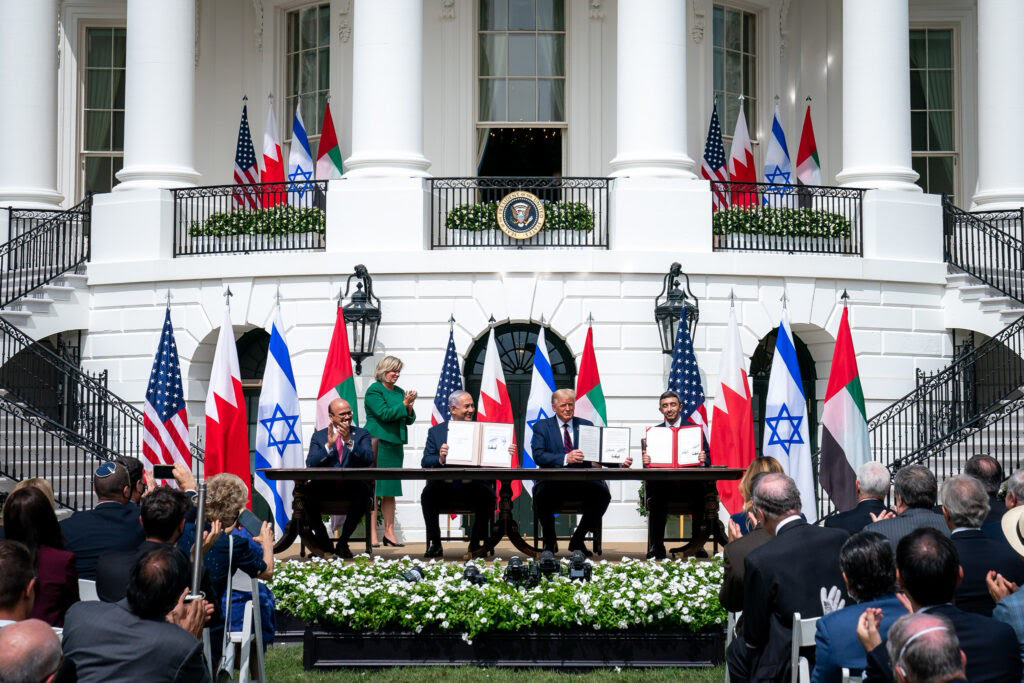Give Peace a Chance: the United Arab Emirates & Bahrain Officially Recognize Israel as a State

Image Courtesy of U.S. Department of State
By Justin Lamoureux
Tuesday, September 15 marked a turning point in Middle Eastern geopolitics. In what many diplomats and experts lauded as “groundbreaking” and “historic,” the United States fostered a normalization treaty in which the United Arab Emirates and Bahrain officially recognized Israel as a state.
Flanked by Israeli Prime Minister Benjamin Netanyahu, Bahrain Foreign Minister Abdullatif al-Zayani, and UAE Foreign Minister Abdullah bin Zayed Al-Nahyan, President Trump declared that “there’s going to be peace in the Middle East.” The White House likewise extolled the agreement as the deal of the century and went on to compliment Trump’s “leadership and expertise as a dealmaker.”
Known in diplomatic circles as the “Abraham Accords,” this treaty includes 12 different points, each addressing a key area of mutual interest for the aforementioned nations. These relate primarily to matters of diplomacy, such as the normalization of bilateral ties and the establishment of foreign embassies.
Naturally, the agreement will yield substantial benefits for a multitude of parties. According to The Atlantic, the United Arab Emirates’ current government is “deeply unpopular with Democrats.” Should Trump lose re-election in November, this treaty will grant the Emirates increased leverage when establishing ties with a new administration.
The United Arab Emirates, along with other Middle Eastern states who engage with Israel, will now benefit from more advanced weaponry. For decades, the Israeli military has benefitted from increased support from the United States, both in terms of funding and defense equipment. The Abraham Accords could give the Emirates a similar advantage.
Make no mistake though, Israel will also benefit from the treaty. At least, Prime Minister Netanyahu will. This diplomatic milestone offers a distraction from the controversies with which his government is fraught, specifically what many deem an unsuccessful response to the COVID-19 pandemic and enduring tensions with neighboring Palestine. The Israeli cabinet and Knesset will also be sidetracked, as they are tasked with the ratification of the Accords.
While Israel reaps the rewards of unprecedented diplomatic maneuvering, Palestine will be further marginalized by this agreement. It’s simple: Palestinians have long been subject to hostility from the United Arab Emirates and other powers in the Middle East. Despite a clause of the Abraham Accords which suspends Israeli annexation of parts of the West Bank, the formation of a geopolitical alliance between Israel and said governments will make ensuring fair representation for Palestine at the international level exceedingly difficult to achieve.
The treaty will also pose a considerable threat to what could be the member states’ largest rival power in the region: Iran. With Israel and nearby countries forming a de-facto coalition, leadership in Tehran is expected to become increasingly vulnerable. According to VOA News, many experts believe that if additional Middle Eastern powers join the accords, Iranian influence over regional affairs will be reduced considerably.
Unsurprisingly, the treaty enjoyed a heartening reception from Jewish leadership in the United States, who have long advocated for peaceful relations between Israel and her neighbors. This includes such organizations as the American Israel Public Affairs Committee (AIPAC) and the National Council of Young Israel. The latter represents the Modern Orthodox Jewish community, among whom support for President Trump and the state of Israel is especially strong.
American Jewish Council (AJC) CEO David Harris attended the signing ceremony on the South Lawn of the White House. “History was made today thanks to the dedication of President Trump to advance Arab – Israeli peace, to Prime Minister Netanyahu’s vision, and to the wisdom and courage of UAE and Bahrain leaders to endorse Israel,” Harris remarked.
While many current government officials in the U.S. and Israel approached this treaty in a celebratory manner, veteran Israeli diplomats and politicians offered far more restraint. Some even expressed skepticism.
In a recent interview with Israeli Ynet News, Brig. Gen. (ret.) Michael Herzog noted that “a formal agreement takes a lot of time to articulate and draft. It has to go through legal experts who weigh every word.” Herzog, who facilitated negotiations between Israel and Palestine, Jordan and Syria during the 1990s, added that he believes President Trump and U.S. diplomats wanted to complete the deal before the upcoming presidential election.
Gilead Sher, who served as chief of staff to former Israeli Prime Minister Ehud Barak, maintained similar reservations. Sher also insists there “was never a real conflict” between the nations encompassed by the agreement.
He also underscored that Israel and the U.A.E. had been engaged in mutual diplomatic relations for over a quarter-century before a formal treaty was signed. “This isn’t a historic breakthrough,” Sher attests.
With many different elements at play, the essential question remains largely unanswered: “Is this treaty good or bad?” Simply put, the Abraham Accords present a double-edged sword: They promise to create a “level playing field” in terms of diplomacy and to unite previously dueling forces against an adversary that poses a grave threat to nations across the globe. But they also leave the longstanding “two-state solution” between Israel and Palestine largely one-sided and solidify trends of subordination.







